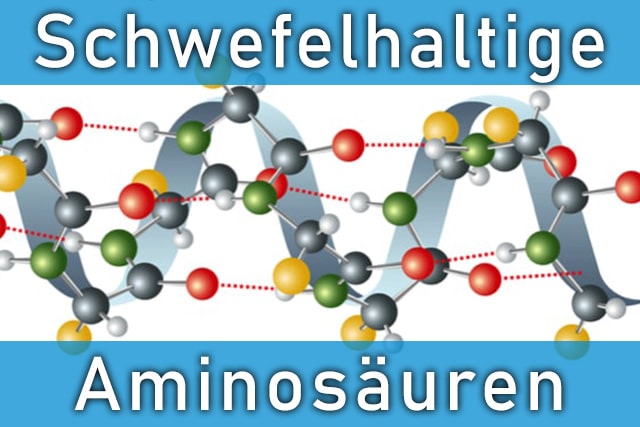If you are actively working on building your muscles, your exercise and nutrition program should be right. Proteins play a major role in healthy, constantly growing muscle mass.
The proteins ensure that muscle cells that are stressed during training are repaired and at the same time the muscle fibers are thickened.
How much protein do you need for more muscle? When should you best consume which protein sources?
Find out helpful information on the topic of “ protein building muscle ” in this article.

In focus: Amino acids as building blocks for building muscle
Proteins consist of many different individual parts, the 21 amino acids . The aminos link together to form different combinations and form chains that enable them to carry out exactly the task assigned to them.
The body can produce most of these protein building blocks itself, which is why they are considered non-essential.
However, the focus of attention on a healthy diet for building muscle is the nine vital ( essential amino acids ) protein building blocks:
- Methionine
- Lysine
- Valine
- Leucine
- Phenylalanine
- Tryptophan
- Threonine
- histidine
These proteins are not produced by the organism. You should therefore consume these daily through food. This is often where the challenge lies.
Even with a healthy diet, it is hardly possible to put together food according to a precisely tailored amino acid profile . The result is that the body simply uses other protein sources.
However, this is exactly what is counterproductive when building muscle , as coordinated protein building blocks are required to build or maintain the muscles.
A study by several medical schools in the USA therefore came to the conclusion that it can make sense to specifically replenish amino acid depots with dietary supplements .
We recommend preparations such as amino4u , whose amino acid profile is precisely tailored to the cell metabolism.
The special thing about this preparation is that the individual components are already broken down, so that the required substances are available in the bloodstream after just 23 minutes .
This is how much protein athletes need
The German Nutrition Society (DGE) recommends 0.8 grams of protein per kilogram of body weight per day. These reference values for protein intake may be sufficient for a normal lifestyle, but are not necessarily sufficient for athletes and regular exercisers.
In a study published in the International Journal of Sport Nutrition and Exercise Metabolism, scientists come to completely different recommendations for building muscle. The amount of protein needed to build muscle is estimated at up to 2.0 grams per kilogram of body weight every day.
A study published in the specialist magazine “Sport Sciences” makes the absorption of proteins dependent on the training level. If a daily intake of 1.3 to 1.8 grams per kilogram of body weight occurs, the muscle mass is optimally stimulated for growth.
However, the final amount depends on the training level and intensity. According to the researchers, anyone who trains intensively and wants to promote fat loss at the same time should consume at least 1.5 to 2.0 grams of protein per day.
The protein requirement is therefore highly individual. If you are just starting to exercise, the scientific recommendation is that you should consume between 1.3 and 1.8 grams of protein per day per kilogram of weight.
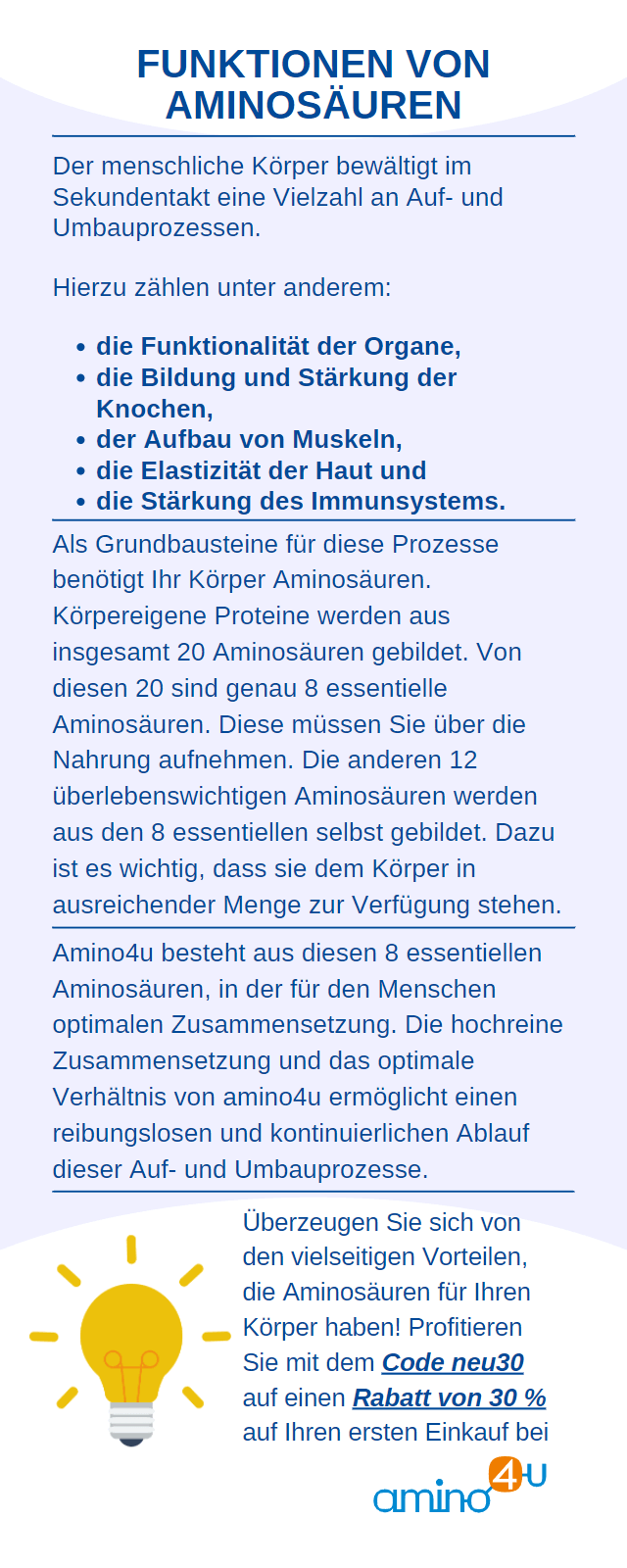
Protein to build muscle: When it comes to proteins, the value is important
Not all proteins are the same - but which source is the best? Scientists at the College of New Jersey also investigated this question.
The results were presented at a sympho at the International Society of Sports Nutrition . The basic measure is the so-called biological value. This value indicates how well the body is able to absorb and utilize a dietary protein .
The more proteins the body can form from 100 grams of a food, the higher the value. The front runner is the egg, including the yolk, with a value of 100. You can compare any other food with this value.
Low-fat quark and Harz cheese have a value of 81, tuna has a value of 72 and turkey breast has a value of 70. Whole-grain bread, which is rich in carbohydrates, is still recommended as a medium-quality source of protein with a value of 49.
Although the value is a good guide, it depends on whether a food is of plant or animal origin. In the laboratory, the researchers demonstrated that the amino acid structures of animal proteins are very similar to human proteins .
To put it simply, the basic structure of humans is more similar to that of a cow than to that of a soybean. Should you now switch your diet exclusively to meat, eggs and dairy products?
The scientists make the following recommendations:
- Anyone who is interested in building their muscles or is currently in the bulking phase generally needs more protein than moderately active people.
- Animal proteins are an important source of protein because humans can utilize them optimally.
- According to study results, an unbalanced diet based only on animal protein sources can promote high blood pressure or high cholesterol levels. High blood lipid levels can also result.
- The US scientists recommend maintaining a balanced diet with animal and plant proteins .
The advantage of the mix of animal and vegetable protein sources is that it increases the likelihood of getting relatively close to the ideal amino acid profile .
If you then take a dietary supplement such as amino4u , the best foundations for protein muscle building are laid.
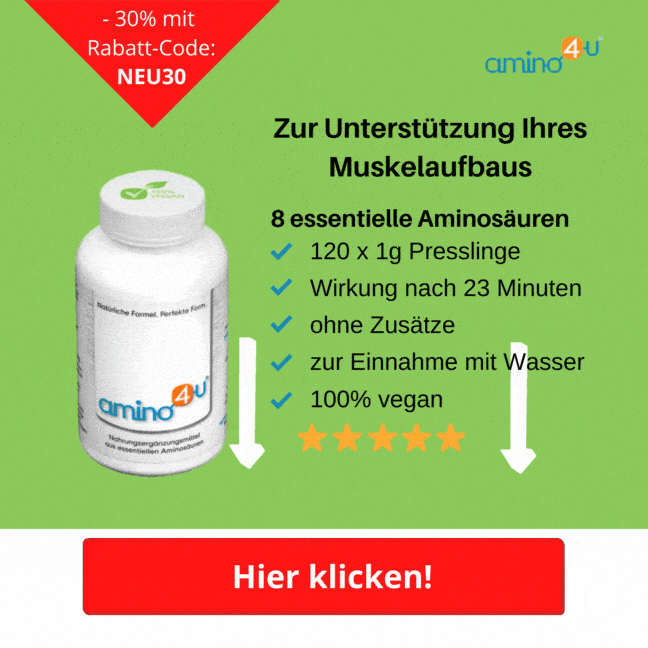
It may be advisable that you have your blood values checked by your doctor before creating your nutrition plan for muscle training. For example, if your cholesterol is high, it is advisable not to consume too many animal proteins.
In this case, replace more components of your meals with plant-based protein sources.
These also provide you with lots of healthy fiber, which keeps you full for a long time and activates your digestion . At least that's what a manual from the US National Research Council (US) Committee on Diet and Health recommends.
These are the top protein sources
The news that the best way to build muscle is to combine proteins in a variety of ways not only ensures variety on your plate, but also makes vegetarian and vegan athletes happy.
The biological value of every meal can be increased through clever composition. For example, the combination of egg and potatoes achieves a value of 136, eggs and milk together result in 119.
According to a study by California State University, the body is able to absorb 0.4 grams of protein per kilogram of body weight per meal. That would be 1.6 grams per kilogram per day with three main meals and a snack.
If the body is already used to higher amounts, you can increase this value to 0.55 grams per kilogram of body weight per meal. Not all components have to be eaten together to achieve the maximum biological value.
The amino acid profile complements each other even if there are four hours between individual meals. But which proteins should be on the diet to build muscle ?
You get high biological value from the following five protein sources:
- Eggs
- beef
- Chicken and turkey
- tuna
- lowfat quark
The following plant-based protein sources can help provide you with optimal nutrition:
- tofu
- Legumes such as chickpeas
- nuts
- potatoes
- oatmeal
Good to know: If you decide to build muscle low-carb , which means low in carbohydrates, you should be careful with oatmeal and potatoes. In this case, choose lentils, white beans, soy schnitzel and parmesan cheese.
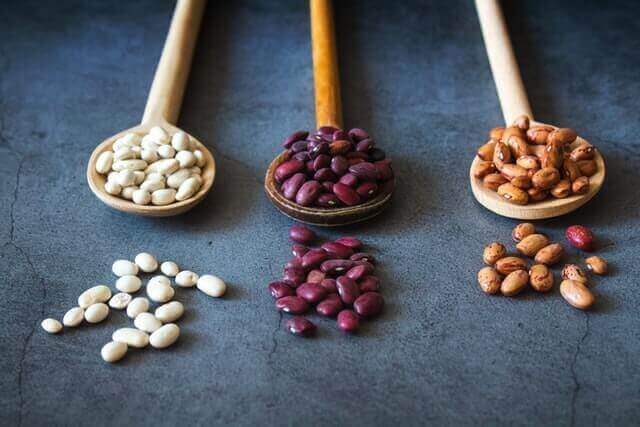
Protein muscle building: Are additional preparations useful?
Protein Muscle building is not possible without appropriate supplements, protein shakes or a muscle building preparation ? This opinion persists in strength training circles. In fact, the need for proteins can be met through a balanced diet.
But athletes who repeatedly push the limits of their endurance can definitely benefit from protein powder and other products . Especially if you combine training with a diet.
Because the shakes keep you full for a long time and only have a few calories. Depending on whether you mix the powder with milk or water, this meal only has 150 to 300 calories.
If you also combine your shakes with a preparation like amino4u, the amino acid profile will also be balanced. As a joint study by US universities shows, protein supplements certainly stimulate muscle building.
Protein powder is ultimately also practical. In stressful everyday life, you can quickly prepare a meal that provides you with optimal protein . You can also drink or prepare the shakes on the go.
There are also numerous flavors available on the market. This means there is always variety.
Important: Protein powders are dietary supplements. You can use it to replace regular meals and the powder is also useful for hard training. Protein powders are not an option as the sole solution.
Protein powder
There are a plethora of different types of protein powder on the market. Whey protein from whey is very popular among athletes. The biological value of this protein source is high and the powder is quickly absorbed into the bloodstream.
This means that the muscle cells can use these building blocks to build and repair muscle tissue within a short period of time. The portion of milk protein that does not end up in whey is called casein.
This milk protein is absorbed slowly but consistently by the body. The amino acids proteins are available to the body for up to eight hours. Casein protein is also often chosen for diets because this protein powder is said to keep you full for a long time.
However, due to the high lactose content, it is not suitable for allergy sufferers. So-called multi-component powders are made up of different types of proteins , including whey and casein.
The goal of these blends is to provide your body with protein in both the short and long term. There are also more and more varieties of purely plant-based protein powders .
In addition to soy, hemp protein, pumpkin seed protein and also rice and pea protein can be found on the market. This also allows vegans to optimize their protein profile.
According to study results , they consume significantly less protein than athletes who regularly eat meat. By the way: Rice protein has the highest protein content among vegan powders. However, building muscle vegan is not impossible.
When it comes to protein powders, you generally have the choice between concentrate and isolate. This refers to different production processes. Isolates are considered to be of higher quality. A special technique ensures that the protein content is maximized while at the same time reducing carbohydrates and fats in the powder.
This means that isolate also contains less lactose. Concentrate contains all of the lactose and the fat content is around five percent.
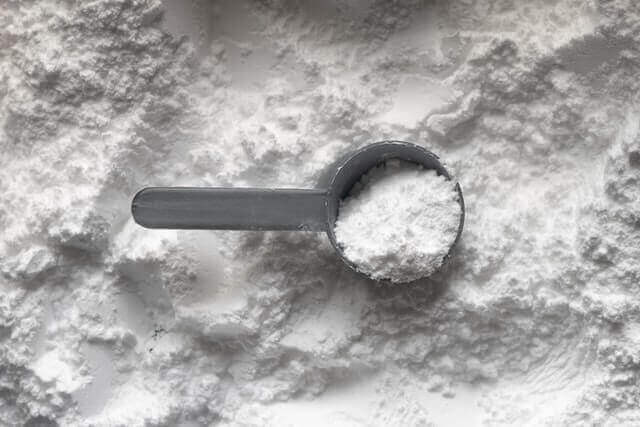
When should protein be taken - before or after training?
In order for the body to effectively convert protein from food into muscle , it is necessary to use the so-called anabolic window. This means a small period of time directly before or after training.
However, the Society of Sports Nutrition has refuted this assumption in a study. Brad Schoenfeld's team examined 40 scientific studies.
What all studies had in common was that the test subjects consumed protein one hour before or after training . The other group had to wait at least two hours for protein intake.
When taken immediately before or after the workout, the researchers did not see any clear benefits. However, evidence was found that the timing of protein intake is not so unimportant after all.
Protein muscle building should be accelerated by an increased dose of proteins directly after training. At the same time, there was also evidence that the muscles only really become active and begin to build up six to eight hours after protein intake.
Until science comes to a clear conclusion, the researchers advise athletes to continue to eat smaller " bites of protein " every two hours after training so that the right time is not missed.

